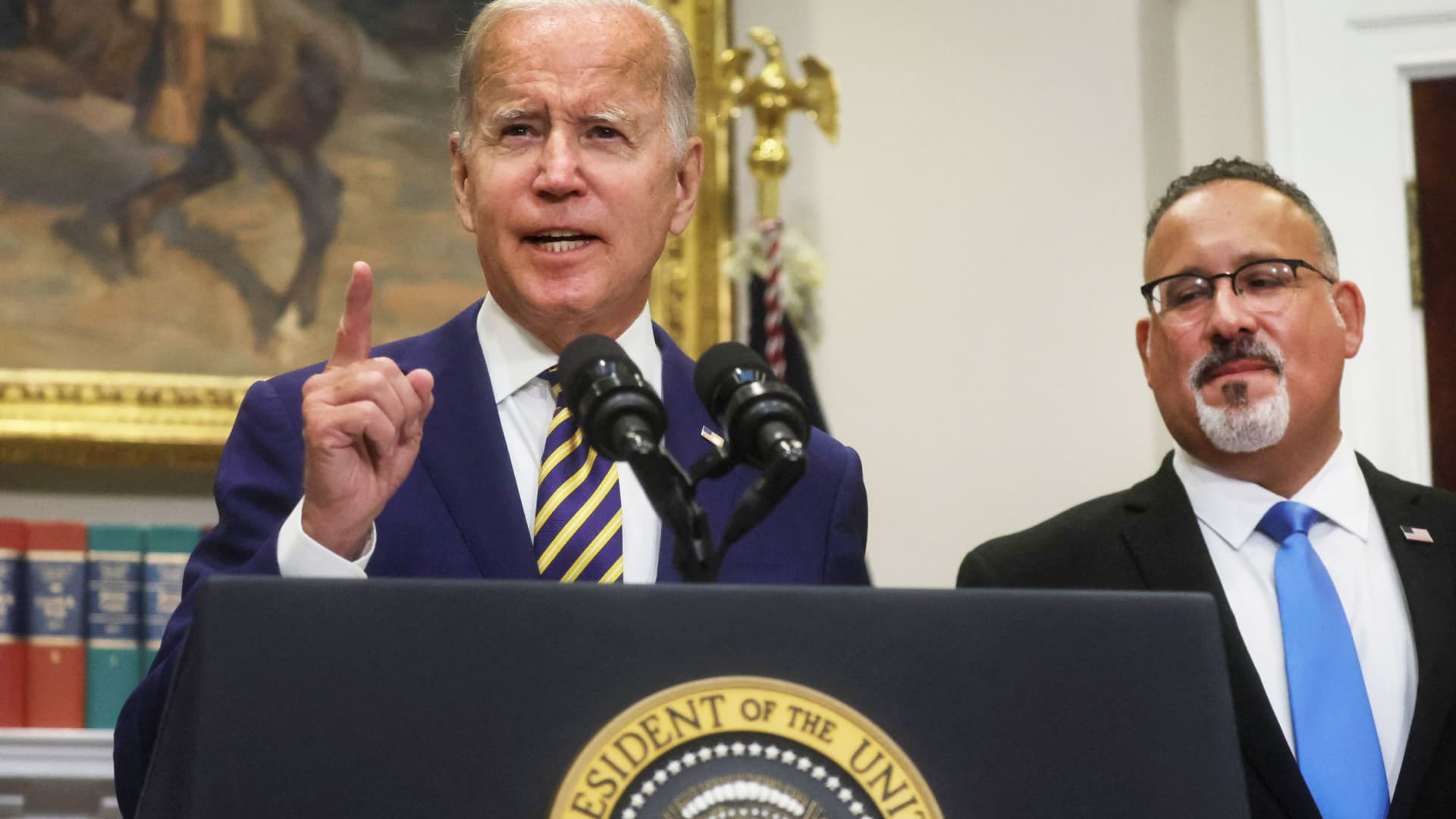Products You May Like
The tens of millions of Americans who’ve been celebrating news of student loan forgiveness are now stuck in limbo as Republicans mount legal challenges to the Biden administration’s plan.
In August, President Joe Biden announced that most federal student loan borrowers will be eligible for some forgiveness: up to $10,000 if they didn’t receive a Pell Grant, which is a type of aid available to low-income undergraduate students, and up to $20,000 if they did.
The White House has said that borrowers will be able to start applying for the relief this month, and could see their lowered or eliminated balances within six weeks.
More form Personal Finance:
Inflation and higher rates are a ‘dangerous mix’
How persistent high inflation may affect your tax bracket
These steps can help you tackle stressful credit card debt
However, those plans may now be in jeopardy. Here’s what borrowers need to know.
At least three challenges have been filed so far
On Sept. 27, Frank Garrison, an attorney working for a conservative legal group, brought the first legal challenge to Biden‘s plan, arguing that forgiveness would cause him personal injury in the form of a state tax bill.
Canceled student debt can be considered taxable income. Although borrowers won’t be required to pay federal taxes on their canceled student debt, thanks to a Covid pandemic-era relief provision in the the American Rescue Plan of 2021, some states — including Indiana, where Garrison resides — may charge levies on the relief.
Currently, Garrison is pursuing a government program that leads to tax-free debt cancellation, known as Public Service Loan Forgiveness, but he says Biden’s plan could now cause him to get a $1,000 state tax bill.
Two days later, on Sept. 29, six Republican-led states — Arkansas, Iowa, Kansas, Missouri, Nebraska and South Carolina — filed a lawsuit to block Biden’s action. The GOP state officials argue that the president doesn’t have the power to issue nationwide debt relief without Congress. They’re also claiming that the policy would harm private companies that service some federal student loans by reducing their business.
On the same day, Arizona Attorney General Mark Brnovich brought his own legal challenge to stop the Biden administration’s plan. Brnovich asserts that the policy would reduce the impact of the Public Service Loan Forgiveness program, which he says enables his office to recruit legal talent.
The PSLF program allows those who work for the government to get their debt discharged after a decade. If borrowers’ loans are simply discharged now, Brnovich argues, they’ll have less of an incentive to work for the state office. Lawyers in private practice tend to get paid more.
‘There is little merit in their challenge’
The main obstacle for those hoping to bring a legal challenge against Biden’s plan has been finding a plaintiff who can prove they’ve been harmed by the policy. “Such injury is needed to establish what courts call ‘standing,'” said Laurence Tribe, a Harvard law professor.
Tribe isn’t convinced the current lawsuits filed have successfully done that.
“They keep looking for different ways to establish standing, and that’s all well and good, but in the end, it is the merits that matter, and there is little merit in their challenge,” Tribe said.
Higher education and legal expert Mark Kantrowitz said it was possible a judge may overlook an imperfect case of standing, however, because of the larger questions at play here, including the scope of the president’s power.
“The president’s student loan forgiveness plan will likely be overturned if it reaches the U.S. Supreme Court,” Kantrowitz said.
Legal action could delay forgiveness
Whether or not these challenges are ultimately successful, they’re likely to slow down the forgiveness timeline.
With a federal judge deciding whether or not to grant GOP-led states’ request to block Biden’s plan, the administration already has said it will not cancel any student debt before Oct. 17.
The policy could be “tied up in the courts for months,” Kantrowitz said.
Court battles could extend payment pause
If the battle over student loan forgiveness drags on, the Biden administration may decide to extend the pause on monthly payments yet again, Kantrowitz said.
Currently the bills, which have been on hold since March 2020, are scheduled to resume in January. But it may be too messy to turn them back on while it’s still uncertain what people owe because forgiveness remains up in the air.
For now, borrowers should stay up to date with developments. You can sign up on the Education Department’s website for news about the process, including when the forgiveness application will be live.
Ideally, you’ll be ready to request relief as soon as the form launches, experts say. If you get your loans forgiven before a lawsuit possibly gets in the way, you might get to keep it, Kantrowitz said, “even if the courts rule against the Biden Administration.”
